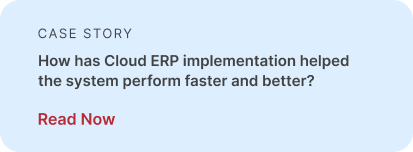Top 7 ERP solution for Healthcare Industry
ERP for healthcare is vital for the healthcare industry, which works under duress.
It helps healthcare organizations overcome challenges such as payment processing, invoicing, staff shortages, data silos, higher operational costs, cybersecurity threats, and transparent pricing.
ERP systems aid healthcare professionals in patient care, budgeting, strategic planning, managing facilities, and accessing dependable technology systems.
However, the requirements of healthcare systems can vary widely, so there is not a one-size-fits-all solution for everyone.
For instance, organizations might have different requirements focusing on medical supplies, robust patient care, complying with regulations, adapting to changes, and tracking patient data & care.
So, our team of experts analyzed various ERP system, and we have come up with the top seven ERP systems.
Let’s uncover ERP systems in healthcare without any ado!
What is ERP Healthcare?
ERP, or Enterprise Resource Planning, helps organizations manage their daily operations, such as project management, procurement, project management, risk management, financial planning, etc.
In the case of healthcare, ERP healthcare systems can be used on various levels.
For instance, doctors can use it for appointment and leave management, hospitals can use it for ward & patient care, and medical suppliers can use it for compliance and billing.
The Top Seven Best ERPs for Healthcare
There are so many options available, and choosing between them can be overwhelming. We will discuss seven options in detail, helping you choose the best option:
Microsoft Dynamics 365 Business Central

Microsoft Dynamics BC is an ERP system that also comes with CRM capabilities, helping healthcare organizations streamline their operations, such as clinical care, risk management, and financial management.
Healthcare businesses face challenges in bed management, understanding the cost associated with any diagnosis, maximizing the use of high-tech equipment, medication errors, and more.
Hence, Business Central, a healthcare ERP software, helps businesses schedule appointments, minimize wait times, and optimize patient flow.
Healthcare entities can seamlessly track their resources and improve staff productivity.
Additionally, Dynamics ERP allows you to store and access the data for complete transparency.
A healthcare organization can access an embedded system to leverage budgeting, accounting, and expense management functionality to streamline the financial process.
However, it is a good fit for small and medium-sized businesses with cutting-edge features for complex operations.
Features:
- Compliance management
- Patient engagement
- Telehealth integration
- Inventory optimization
- Compliance management
Epic

Image Source: Epicor
Epic offers integration with an electronic health records (EHR) system, which makes it famous among healthcare professionals.
Users can customize templates, get a comprehensive view of customers, share data between various departments, and use them without ado.
The ERP system allows electronic prescribing, offers patient engagement tools, and streamlines revenue cycle management, billing, and claims processing.
Moreover, this software ensures you comply with the regulatory requirements.
However, Epic can be expensive for small healthcare organizations. Its implementation can take longer compared to other ERP systems.
If you want to manage other aspects of business besides healthcare, integration can be challenging.
Features:
- Multiples modules
- Medical Templates
- Charting system
Microsoft Dynamics 365 Finance and Operation

Dynamics 365 Operations and Finance can be a powerful ERP solution for healthcare that wants to simplify its complex finance and supply chain operations.
It provides robust financial features, such as a general ledger, accounts payable and receivable, budgeting, and forecasting, to simplify the complex process.
Healthcare organizations can leverage real-time insights to improve cash flow management and optimize resource allocation.
The Microsoft ERP systems also help healthcare organizations manage their medical supplies, equipment, and pharmaceuticals with their comprehensive features, like inventory control.
You can ensure medical stock is available, especially for some rare medicines.
This Msft ERP (Microsoft) solution is also highly scalable and allows you to personalize the system according to your business needs and workflow.
Features:
- General ledger
- Accounts Payable/Receivable
- Budgeting
- Inventory control
- Purchase orders
- Track progress
- Integration with EHR and scheduling systems
NetSuite

Image Source: Oracle Netsuite
NetSuite aims to help healthcare and life sciences organizations deal with constant regulatory change in the healthcare industry.
It allows healthcare organizations to increase visibility, reduce complexity, and give privacy the utmost importance.
It offers a single repository for patient interactions, improving the quality of patient care.
The ERP system allows for the storage and management of patients’ information, such as medical history, insurance, demographics, and billing.
Furthermore, it can integrate with electronic health records (EHRs) and other clinical systems to provide a 360-degree view of data.
You can manage and track equipment, medical supplies, and pharmaceuticals.
The ERP system can also aid in financial management, such as accounts receivable and payable, invoicing, billing, and financial reporting. Organizations can manage budgets, expenses, and revenue.
However, it requires a high upfront cost, and implementation might be complex. A small healthcare organization might not find it suitable and can be overwhelmed due to simpler needs.
It might demand IT expertise for configuration and ongoing management.
Features:
- Integrated budgeting and forecasting
- Compliance and security
- Financials and accounting
- Unified global business management
WebPT

The ERP software offers a wide range of features, such as complaint-focused patient engagement tools, billing, and appointment scheduling.
However, it has limited customer support and a limited scope of practice and might be expensive compared to other ERP systems. It also might not be suitable for complex healthcare organizations.
Integration with the external system is also limited.
Features:
- Personalized EHR for rehabilitation therapy.
- Telehealth capabilities
- Practice management tools
Sage Intacct

Businesses can use this ERP system to manage their financial transactions with features like accounts payable and receivable.
It can also be beneficial to manage inventory, such as drugs, equipment, and medical supplies.
With this ERP software, you can automatically reorder inventory, track inventory, and manage vendor relationships.
Businesses can manage their revenue from insurance companies to patients, allowing them to process payments, generate invoices, and manage claims.
You can also store patient data, medical history, insurance, and demographic information.
However, this ERP system has limited scalability and might not be suitable for organizations with complex needs.
Its customization options are also limited and require additional efforts for integration with external systems.
Features:
- General ledger
- Revenue cycle management
- Grant management
- Cost accounting
- Built-in security features for HIPAA compliance
NextGen Healthcare

Image Source: NextGen Healthcare
NextGen Healthcare is designed to help healthcare businesses provide high-quality service to patients. It offers practice management software, patient engagement tools, and integration with electronic health records (EHR).
Healthcare companies can customize these solutions as per their requirements. However, it might be expensive for healthcare companies. You need to provide additional training to your team to fully utilize its features.
Moreover, many users have faced issues with its performance and reliability while managing large amounts of data.
Which ERP Software Should You Consider?
In this blog, we have discussed the top seven ERPs for healthcare, and the list goes on and on.
When choosing a perfect solution from the endless list, you need to take several factors into consideration, such as the size of your business, budget, integration capability, and patients’ safety.
So, choosing a suitable ERP system can be a hectic task. If you want further assistance in choosing the best ERP for healthcare, reach out to our expert consultants.
They will understand your requirements and help you choose the best option.
Schedule a free consultation call with us at +1 778 381 5388 or draft an email at info@dynamicssquare.ca.
People Also Ask
What does ERP stand for in healthcare?
ERP in the healthcare industry stands for Enterprise Resource Planning, helping organizations improve efficiency, reduce costs, and provide better patient care.
Where is ERP used in healthcare?
ERP in healthcare can be used to manage processes and resources and can help organizations run more efficiently.
Healthcare organizations can use the ERP system for patient data management, financial management, and staff management.
What ERP do most hospitals use?
Healthcare organizations use top healthcare ERP systems for electronic health records (EHR), practice management, financials, a HIPAA-compliant patient portal, and medical supply ordering.
Most hospitals use Microsoft ERP for their requirements.
What Is ERP and EMR?
ERP and EMR are both software systems that healthcare organizations can use to improve efficiency, reduce costs, and provide better patient care. ERP systems allow organizations to manage and automate many business operations.
EMR systems manage the electronic versions of patient medical or health records, such as diagnoses, medicines, tests, and allergies.



